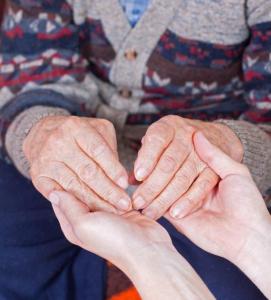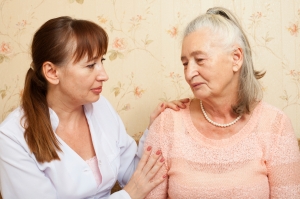The question seems sooo simple, but the answer is very complicated. The simple answer is…. It all depends!
It depends on what medical condition/s the person is living with, what their home living circumstances are like and what their views about living in care are, as well as the views of their family.
Some medical conditions make it virtually impossible to be cared for at home, because of the complexity of the condition, the equipment that might be needed or the availability of skilled staff. However the conditions that make it virtually impossible are relatively rare and although it might be quite tricky to continue to stay at home with some conditions, it remains possible. Some equipment can be costly and/or cumbersome and therefore not suitable for an average domestic home, but homes can be adapted. Some adaptions are necessary, and not that difficult, installing a stair lift for example or grab rails in the shower. The stair lift is quite expensive, but grab rails are very easy and cheap to install.
Sometimes the person with dementia needs really skilled staff to help support and encourage them. It can also take a great deal of patience, which might mean that the carer/s needs a break from time to time, so that they can maintain their own emotional resources to deal with the situation. When someone is angry, shouting and aggressive it can take a calm and gentle approach to distract them from what has agitated them, which can be difficult, in what seems to be a threatening environment. It can also become very tiring for example, if the person with dementia becomes paranoid and accusational. Therefore sustainability of the system of carers needs to be considered, whether the carers are paid or unpaid family carers.
The next consideration is the physical living environment at home and its sustainability into the future. Considering how an individual may deteriorate in the future and trying to future proof that potential deterioration, with either adaptions to the property or the knowledge that with some piece of equipment can be brought in to adapt to a likely imminent deterioration. As well as looking at the living space, which might be the entire house that they live in or a few rooms within its, it is worthwhile considering the wider community and area. Are there support services that the person with dementia can go to see, such as memory cafes? Is there a network of friends that the person with dementia can still visit? And then some more basic things such as how easy is it to get to the shops so that they can buy food?
The final thing to consider is the views of the individual themselves and also their family members. I have had a client say to me, that no matter how bad things get that home they will NEVER go into a care home. I’ve also had another client say to me that she was quite lonely at home after her husband died and was happy to be admitted into a care home, as she recognised she had some needs that needed a little help, but what care home did more than anything else was give her a community to belong to and company to be with. Family members can also have a strong view one way or another whether or not person should go into care. Generally most people say that they would prefer to home as long as possible.
So back to the question, it’s often about staying at home until it becomes impossible to do so. But what constitutes “impossible” is around the tolerance of what people will accept as a standard of care and an acceptable standard of living environment. Each person and their family have different view on what makes living at home versus living at care the right answer. This also means that there is no one definitive time when it’s the right time, it’s always about when it’s the right time for that person as a unique individual. It’s always about kindness, respecting their choice and compassion for them.










